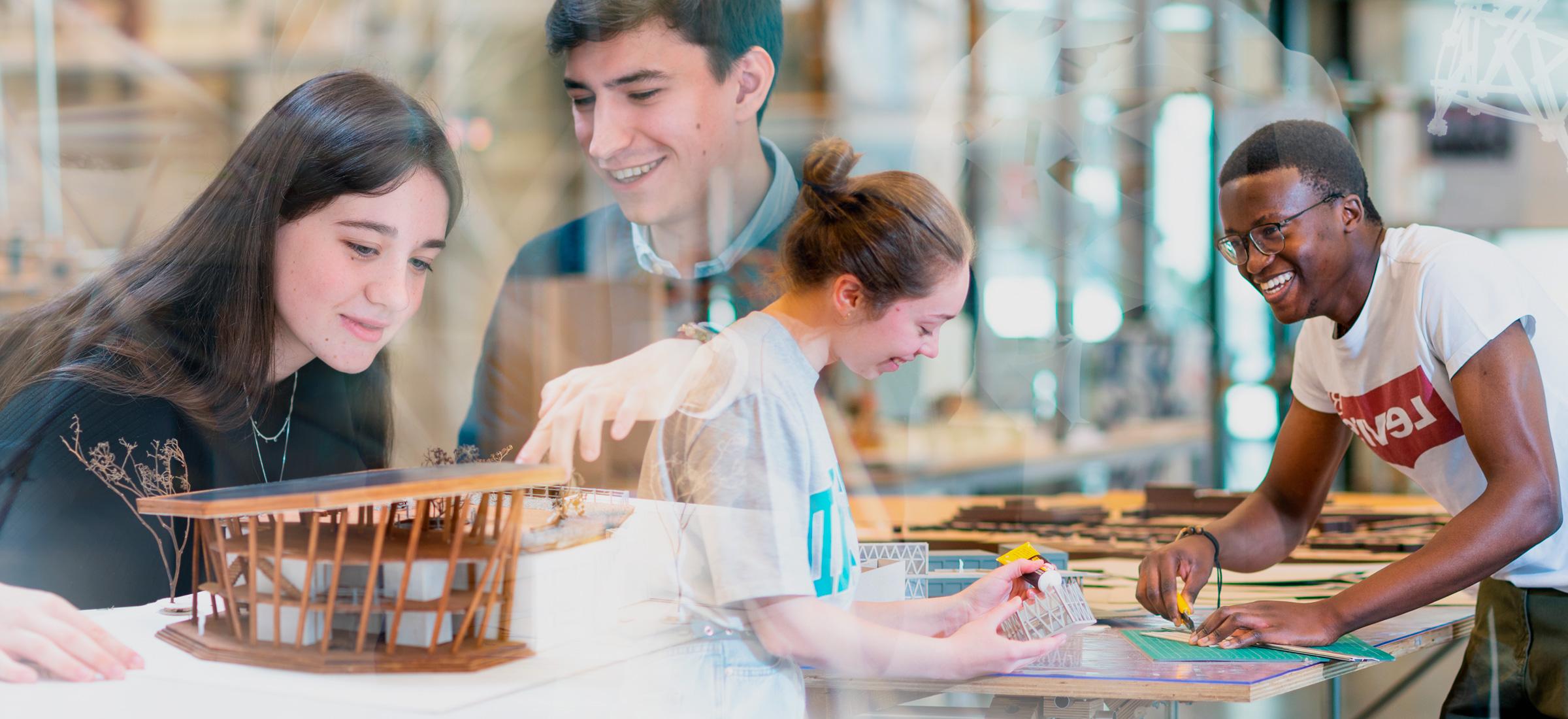
Educational quality of the programme
At VUB the quality of the education takes centre stage. This isn't something we say lightly: we scrutinise our programmes regularly to align them with changing student needs in a rapidly changing society. Additionally, the engineering programmes in Flanders are audited by an external commission: Commission des Titres d’Ingénieur (CTI, France).
Public information of
Bachelor in Architectural Engineering
This public information is part of VUB’s quality assurance system. The Dutch version of this text was ratified by the Academic Council on 19/06/2023. Below is a translation.
Strenghts of the programme
- Broad education: at the start of the bachelor's programme, a broad academic foundation of architectural, design and core sciences is laid. Throughout the programme, these three fields become increasingly intertwined and students become more familiar with the combination of technology and creativity.
- Project work: throughout the entire rogramme, there is a lot of hands-on teaching and learning during which students work together on (design) projects. Evaluation is often (partly) done by presentations and peer assessments. Students learn how to communicate, to correctly give feedback and to handle criticism.
- Workfield participation: several lecturers also work in the architectural profession. By integrating this expertise into the lessons, students are introduced early on to the latest trends in contemporary architecture and engineering practices, the latest technologies and techniques, policy and responsible and sustainable business practices.
- Sustainability: from the very start students are encouraged to think about important issues concerning sustainable development, social responsibility and ethics.
- Individual follow-up: the programme is committed to offering individual follow-up and support to students. Regular, friendly and intensive contact between lecturers and students is highly appreciated by both students and the staff.
Opportunities
-
Formalising the spontaneous contacts and feedback that take place during the annual alumni event for Civil Engineering and Architecture offers opportunities towards optimising the curriculum in a more focused manner.
-
Continued focus on improving the digital skills of the students will help to ensure that they are fully prepared for the jobs of the future.
Current developments
- The programme reviews the curriculum to monitor and improve the logical progression of themes throughout the programme.
- The programme wishes to avoid a proliferation of digital tools and to make sure the online learning platform is more transparent and structured for students and lecturers alike. For that purpose the programme is developing clear guidelines to streamline the use of various innovative and digital teaching methods throughout the programme.
- Data on exam participation and success rates are examined to identify and remedy any hurdles for the students' progression.
Master in Architectural Engineering
This public information is part of VUB’s quality assurance system and was ratified by the Academic Council on 19/06/2023.
Strenghts of the programme
- Architecture and engineering: the programme trains architectural engineers with a sound foundation in architectural sciences, engineering sciences and architectural design knowledge, based on cutting-edge scientific research expertise present in the architectural engineering departments of both Vrije Universiteit Brussel and Université Libre de Bruxelles.
- Sustainability: several courses integrate – implicitly and explicitly – the ecological, social and cultural impact of the architectural engineering discipline. Thus providing students with an awareness of the ever more rapidly changing needs of users and society, and results in rational and critical reflection on the principles of sustainable development for the built environment.
- Solid relation with industry: many lecturers are also active in the professional field and experts are often involved in several courses throughout the programme. This assures that students are exposed to not only an academic perspective, but also an industrial perspective.
Opportunities
-
Creating a specific lab for architectural sciences would accommodate the students of Architectural Engineering even better.
-
The alumni-event jointly organised by Architectural Engineering and Civil Engineering offers an interesting opportunity to gather, in a more structured and formalised manner, the input of the work field aimed at further enhancing the programme.
Current developments
- The curriculum has been updated in order to improve the study workload and make the study trajectory more logical and more attractive. The implementation of the new curriculum and its impact will be monitored in the coming years.
- To enhance the experience of studying in an interuniversity programme, the programme gives special attention to the collaboration and communication between the universities and toward the students.
- Monitoring the impact of the enhanced admission procedure for international students, by adding a personal interview, has revealed a relatively small number of candidate-students actually enrol in the programme. The programme and the faculty are investigating the cause and possible solutions for this situation.
- Specific attention is given to the integration of the international students. The programme wants to facilitate the inclusion of the new international students by involving peers to guide new students.
Where do we get this information from?
As institution we routinely ask our students to give their honest opinion about the study programme during their academic career. We also consult our professors and assistants and gauge the expectations in the future field of work. We receive structured feedback from our former students and compare our programmes with others at home and abroad. Through a Peer Review every six years an expert panel endorses the programme’s assets and can recommend some actions. Lastly, the Education Quality Council takes a formal decision about the quality and functioning of a programme.
Quality Cycle
Each programme follows a six-year quality cycle. The timeline below shows the schedule for this particular programme.
